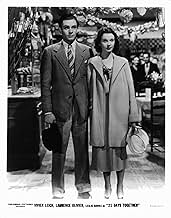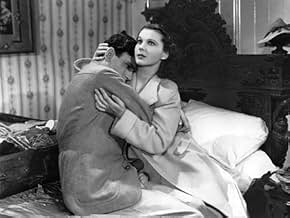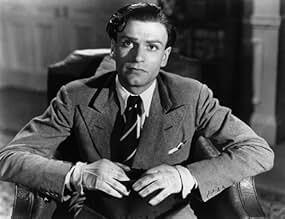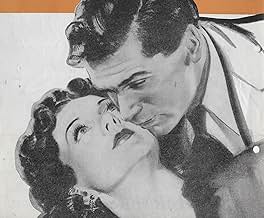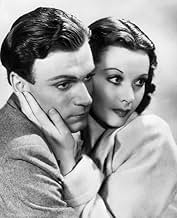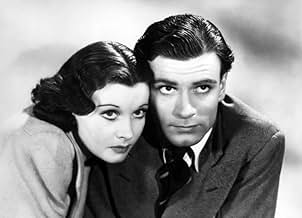IMDb रेटिंग
6.1/10
1.4 हज़ार
आपकी रेटिंग
अपनी भाषा में प्लॉट जोड़ेंAfter Larry accidentally kills his lover Wanda's estranged blackmailing husband, someone else is arrested for the crime. Larry and Wanda nervously await the verdict: if the innocent suspect ... सभी पढ़ेंAfter Larry accidentally kills his lover Wanda's estranged blackmailing husband, someone else is arrested for the crime. Larry and Wanda nervously await the verdict: if the innocent suspect is found guilty then Larry will give himself up.After Larry accidentally kills his lover Wanda's estranged blackmailing husband, someone else is arrested for the crime. Larry and Wanda nervously await the verdict: if the innocent suspect is found guilty then Larry will give himself up.
- निर्देशक
- लेखक
- स्टार
Elliott Mason
- Frau. Grunlich
- (as Elliot Mason)
Howard Douglas
- Man Asking for Cigarette
- (बिना क्रेडिट के)
फ़ीचर्ड समीक्षाएं
But not much plot. This was obviously a vehicle for its stars who were married at the time. Lawrence Olivier is quite wooden and stagey, Vivien glows, the camera just loves her. The story is a neat twist on ethics and morality with the wayward no-good brother standing firm for honesty and the uptight, successful barrister brother - on his way to becoming a judge - ready to hang an innocent man for a crime he did not commit. The twenty one days refer to the length of time the trial of this innocent man is going to take. The technical quality of the film was poor, the background of London was nearly washed out and the streets were obviously studio sets, not surprising, as it was filmed at the start of WW2. 5 out of 10, the ending was a bit of a let down and Larry really hams it up.
Graham Greene here made an inauspicious entry into film writing converting a John Galsworthy story he himself considered "peculiarly unsuited to film adaptation" into "the worst and least successful of Korda's productions".
Olivier and Leigh, the gilded young lovers of the Old Vic, had yet to learn how to act before the cameras in this overwrought melodrama with a noisy score by John Greenwood which spent two years on the shelf before eventually slipping quietly into cinemas only after both leads had hit it big in Hollywood.
There are compensations, however, in the graceful work of it's Czech cameraman, some vivid shots of London as it looked in 1937, and above all a moving performance - twelfth in the cast list - by Hay Petrie, who Greene himself declared "enriches every picture in which he appears.
Olivier and Leigh, the gilded young lovers of the Old Vic, had yet to learn how to act before the cameras in this overwrought melodrama with a noisy score by John Greenwood which spent two years on the shelf before eventually slipping quietly into cinemas only after both leads had hit it big in Hollywood.
There are compensations, however, in the graceful work of it's Czech cameraman, some vivid shots of London as it looked in 1937, and above all a moving performance - twelfth in the cast list - by Hay Petrie, who Greene himself declared "enriches every picture in which he appears.
Apparently this is one of those Galsworthy dilemma stories. In it Olivier, early in his career inadvertently kills a man, the estranged husband of his new love. He is faced with the considerable struggle with conscience because a man has been blamed for the act and will face the music. What to do. What to do. We are put in the position of hoping all will somehow work out. I won't spoil the ending, but I will say that Olivier's character could have been sent to the gallows for terminal boredom. At no point did I really care one way or the other. He is selfish in many ways and rather cowardly. While the victim is made to have no redeeming qualities, his death really serves nothing other than that of a plot element. I suppose there is some of that stiff upper lip stuff going on, but at no time did I sit on the edge of my seat. Contrast this to the pain of Jean Valjean who faces a similar question. In that we all need to look inward. This just didn't ask much of me, and I was also greatly disappointed with the conclusion.
21 Days is directed by Basil Dean and adapted to screenplay by the director and Graham Greene from John Galsworthy's play The First and Last. It stars Vivien Leigh, Laurence Olivier, Leslie Banks, Francis L. Sullivan and David Horne.
When Larry Durrant (Olivier) accidentally kills his lover's husband, he decides to hide his crime and the couple embark on a whirlwind romance for the next twenty one days. However, with an innocent dupe on trial for the murder, Durrant's conscience begins to get the better of him.
If it didn't feature Olivier and Leigh then this would have been consigned to the forgotten bin and sealed up post haste. That the stars give it a curiosity value is a given, but one peak at the meagre back story backs up the fact that it really is rather a dull movie. Film was wrapped in 1938 but sat on the shelf for two years and was only released once Olivier and Leigh became big names in 1940. The two stars were more interested in playing footsie under the table than putting any acting depth into the production, something which greatly annoyed director Dean as he was trying to make a gripping crime drama. In fact Viv and Larry were so unhappy with how the film ended up, they reportedly walked out of a screening of it at the halfway point!
Picture is clearly meant to be a scathing observation on the folly of criminal law, wrapped around a male protagonist battling his moral codes as his heart goes pitter patter for a dame. Yet the picture rarely reaches dramatic heights, playing out more as a movie about young lovers inconvenienced by an accident, than one about a cruel twist of fate so pay your penance you loser. Olivier gives good quality mental anguish, again that is a given, but Leigh is just on the sidelines looking pretty and rarely impacting on the narrative. The other cast members work well enough, but everyone seems confused as to just what sort of tone to aim for, in fact taking their queues from Larry and Viv. While the ending lacks an edge, playing out more as a cheap cop out than anything else, geared once again towards how lovely the central couple are together.
Somehow finding its way into a British film noir DVD collection, that's a bit of a bum steer. However, little snippets of visual pleasures do provide bright spots in the viewing experience. The few scenes involving a foggy London of wet back streets and street lamps hint at where the director hoped his movie would dwell, and with cinematographer Jan Stallick photographing continually with shadows prominent, there's just enough to keep it from being a complete wash out on the tech side of things. Ultimately it's very disjointed, a tonally confusing picture in search of a more dramatic and thrilling home, director Dean knew it, producer Alexander Korda knew it, and crucially, so did Olivier and Leigh. Only the most staunch (biased) fans of the two stars can seriously think this is a good movie. 5/10
When Larry Durrant (Olivier) accidentally kills his lover's husband, he decides to hide his crime and the couple embark on a whirlwind romance for the next twenty one days. However, with an innocent dupe on trial for the murder, Durrant's conscience begins to get the better of him.
If it didn't feature Olivier and Leigh then this would have been consigned to the forgotten bin and sealed up post haste. That the stars give it a curiosity value is a given, but one peak at the meagre back story backs up the fact that it really is rather a dull movie. Film was wrapped in 1938 but sat on the shelf for two years and was only released once Olivier and Leigh became big names in 1940. The two stars were more interested in playing footsie under the table than putting any acting depth into the production, something which greatly annoyed director Dean as he was trying to make a gripping crime drama. In fact Viv and Larry were so unhappy with how the film ended up, they reportedly walked out of a screening of it at the halfway point!
Picture is clearly meant to be a scathing observation on the folly of criminal law, wrapped around a male protagonist battling his moral codes as his heart goes pitter patter for a dame. Yet the picture rarely reaches dramatic heights, playing out more as a movie about young lovers inconvenienced by an accident, than one about a cruel twist of fate so pay your penance you loser. Olivier gives good quality mental anguish, again that is a given, but Leigh is just on the sidelines looking pretty and rarely impacting on the narrative. The other cast members work well enough, but everyone seems confused as to just what sort of tone to aim for, in fact taking their queues from Larry and Viv. While the ending lacks an edge, playing out more as a cheap cop out than anything else, geared once again towards how lovely the central couple are together.
Somehow finding its way into a British film noir DVD collection, that's a bit of a bum steer. However, little snippets of visual pleasures do provide bright spots in the viewing experience. The few scenes involving a foggy London of wet back streets and street lamps hint at where the director hoped his movie would dwell, and with cinematographer Jan Stallick photographing continually with shadows prominent, there's just enough to keep it from being a complete wash out on the tech side of things. Ultimately it's very disjointed, a tonally confusing picture in search of a more dramatic and thrilling home, director Dean knew it, producer Alexander Korda knew it, and crucially, so did Olivier and Leigh. Only the most staunch (biased) fans of the two stars can seriously think this is a good movie. 5/10
There are many barriers to love, most can be overcome, but is murder one such obstacle, can a couple allow an innocent man to take the blame for their crime?
It's not as good as some of the movies I've seen from this era and in the same genre, but it is good, it's very watchable, and let's be honest, anything that features Vivian Leigh is worth watching.
It's perhaps a lack of suspense that is the stumbling block, you're left in no doubt as to the ending.
It's a good watch though, nicely made, and very well acted, 6/10.
It's not as good as some of the movies I've seen from this era and in the same genre, but it is good, it's very watchable, and let's be honest, anything that features Vivian Leigh is worth watching.
It's perhaps a lack of suspense that is the stumbling block, you're left in no doubt as to the ending.
It's a good watch though, nicely made, and very well acted, 6/10.
क्या आपको पता है
- ट्रिवियाThe film was shot in 1937 but released on January 7, 1940. William Dewhurst (Lord Chief Justice) died on October 26, 1937. His only child, Paul, died in 1937 fighting in the Spanish Civil War, only a few months before Dewhurst's own demise.
- गूफ़At the end, when Wanda (Vivien Leigh) is chasing Larry (Laurence Olivier) through the streets, she isn't carrying anything. The camera goes to Larry, and when it goes back to her, she's carrying a newspaper as she's still running. Once again the camera goes back to Larry, and the next shot of her, she once again isn't carrying a newspaper but stops to buy one then continues to run after him.
- कनेक्शनFeatured in The Making of a Legend: Gone with the Wind (1988)
टॉप पसंद
रेटिंग देने के लिए साइन-इन करें और वैयक्तिकृत सुझावों के लिए वॉचलिस्ट करें
- How long is 21 Days Together?Alexa द्वारा संचालित
विवरण
- रिलीज़ की तारीख़
- कंट्री ऑफ़ ओरिजिन
- भाषाएं
- इस रूप में भी जाना जाता है
- 21 Days Together
- फ़िल्माने की जगहें
- Southend-on-Sea, एसेक्स, इंग्लैंड, यूनाइटेड किंगडम(Kursaal amusement park visited by Larry and Wanda)
- उत्पादन कंपनी
- IMDbPro पर और कंपनी क्रेडिट देखें
- चलने की अवधि1 घंटा 12 मिनट
- रंग
- पक्ष अनुपात
- 1.37 : 1
इस पेज में योगदान दें
किसी बदलाव का सुझाव दें या अनुपलब्ध कॉन्टेंट जोड़ें


